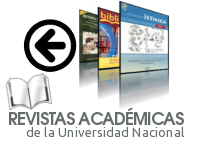Academic Practice for Social Development in the Training Schools of the National Police of Colombia
DOI:
https://doi.org/10.15359/udre.10-1.8Keywords:
pedagogical foundations, academic practices, social projection, community surveillanceAbstract
This article describes the pedagogical foundations of a change proposal to develop a line of social projections, academic practices for social development, within the Curriculum of the Professional Technician in Police Service. This proposal aims to improve the quality of the National Model of Community Surveillance based on small geographical areas (MNVCC) the National Police of Colombia is implementing. The proposal resulted from a study that proposed changing how the social projection of students aspiring to be appointed as police officers is carried out. So, the object of the proposal is just to adjust how this activity is carried out in the police training process. The proposal is based on some pedagogical aspects found within the doctrine of teaching work, established in the Colombian police doctrine and the results evidenced in the research.
In fact, the activities of social projections must be supported and developed from the Curriculum of the Technical Professional Program in Police Service (TPSP), based on up-to-date information and community outreach for the police service. Therefore, the police service was considered as the appropriate subject for the students in their training process to strengthen their approach to the raison d’être of the National Police, which is our Colombian citizenship. Likewise, as an effect on the labor field, prevention, and citizen education, applied to the MNVCC, can be enhanced, and they can have a real impact, from the classrooms, on the police service, strengthening the ability to develop this service safely and professionally.
The study comprises three important aspects. The first one is the relationship between the social outreach activities of the National Directorate of Schools and the prevention and citizen education tasks carried out within the framework of the MNVCC. The second aspect is the academic practices for social development within the curricular plan of the Professional Technical Program in Police Service. The last one is the proposal for strengthening.
References
Fernández, C. M. (2013). ¿Extensión universitaria, proyección social o tercera misión? Revista Congreso Universidad, 2(2), 1-11.
García, J. E. (2018). Fundamentos pedagógicos de una propuesta de ajuste a la línea de proyección social: “prácticas académicas para el desarrollo social”, dentro del plan de estudios del TPSP, para el mejoramiento de la calidad del Modelo Nacional de Vigilancia Comunitaria. Escuela de Policía Nacional, Boyacá, Santa Rosa de Viterbo.
Manuel Area, A. G. (2012). La alfabetización informacional y digital: fundamentos pedagógicos para la enseñanza. Revista Española de Documentación Científica, 46-74
Otero, J. V. (2005). Las tablas de contingencia. https://www.myheritage.es/search-records?action=person&siteId=68915281&indId=1000004&origin=profile: https://www.myheritage.es/search-records?action=person&siteId=68915281&indId=1000004&origin=profile
Policía Nacional de Colombia (2009). Doctrina educativa para el docente policial. Bogotá: Imprenta Nacional de Colombia.
Ruiz, G. (2013). La teoría de la experiencia de John Dewey: significación histórica y vigencia en el debate histórico contemporáneo. Foro de Educación, 11(15),103-124. http://dx.doi.org/10.14516/fde.2013.011.015.005
Saviani, D. (2013). La pedagogía histórica crítica. Barão Geraldo: Autores Asociados limitada.
Downloads
Published
How to Cite
Issue
Section
License

La Revista y cada uno de los artículos que se publican están licenciados por Creative Commons Atribución No comercial Sin derivadas 4.0 Internacional.


